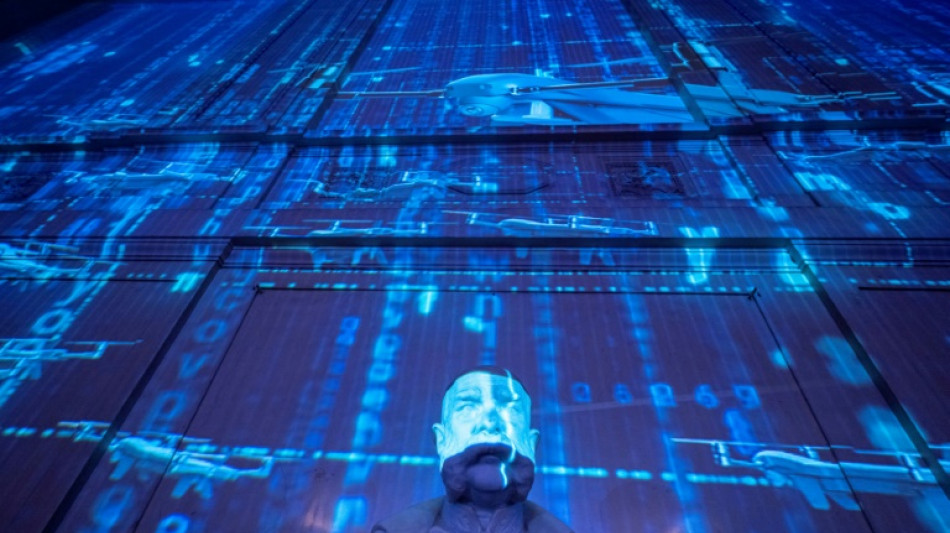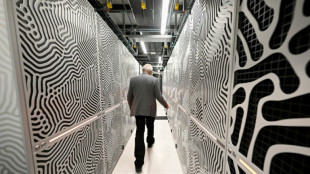
-
 Reyna, Balogun on target for USA in 2-1 win over Paraguay
Reyna, Balogun on target for USA in 2-1 win over Paraguay
-
Japa's Miura and Kihara capture Skate America pairs gold

-
 Who can qualify for 2026 World Cup in final round of European qualifiers
Who can qualify for 2026 World Cup in final round of European qualifiers
-
UK to cut protections for refugees under asylum 'overhaul'

-
 England's Tuchel plays down records before final World Cup qualifier
England's Tuchel plays down records before final World Cup qualifier
-
Depoortere double helps France hold off spirited Fiji

-
 Scotland face World Cup shootout against Denmark after Greece defeat
Scotland face World Cup shootout against Denmark after Greece defeat
-
Hansen hat-trick inspires Irish to record win over Australia

-
 Alcaraz secures ATP Finals showdown with 'favourite' Sinner
Alcaraz secures ATP Finals showdown with 'favourite' Sinner
-
UK to cut protections for refugees under asylum 'overhaul': govt

-
 Spain, Switzerland on World Cup brink as Belgium also made to wait
Spain, Switzerland on World Cup brink as Belgium also made to wait
-
Sweden's Grant leads by one at LPGA Annika tournament

-
 Scotland cling to hopes of automatic World Cup qualification despite Greece defeat
Scotland cling to hopes of automatic World Cup qualification despite Greece defeat
-
Alcaraz secures ATP Finals showdown with great rival Sinner

-
 England captain Itoje savours 'special' New Zealand win
England captain Itoje savours 'special' New Zealand win
-
Wales's Evans denies Japan historic win with last-gasp penalty

-
 Zelensky renews calls for more air defence after deadly strike on Kyiv
Zelensky renews calls for more air defence after deadly strike on Kyiv
-
NBA's struggling Pelicans sack coach Willie Green

-
 Petain tribute comments raise 'revisionist' storm in France
Petain tribute comments raise 'revisionist' storm in France
-
Spain on World Cup brink as Belgium also made to wait

-
 Spain virtually seal World Cup qualification in Georgia romp
Spain virtually seal World Cup qualification in Georgia romp
-
M23, DR Congo sign new peace roadmap in Doha

-
 Estevao, Casemiro on target for Brazil in Senegal win
Estevao, Casemiro on target for Brazil in Senegal win
-
Ford steers England to rare win over New Zealand

-
 Massive march in Brazil marks first big UN climate protest in years
Massive march in Brazil marks first big UN climate protest in years
-
Spain rescues hundreds of exotic animals from unlicensed shelter

-
 Huge fire sparked by explosions near Argentine capital 'contained'
Huge fire sparked by explosions near Argentine capital 'contained'
-
South Africa defy early red card to beat battling Italy

-
 Sinner beats De Minaur to reach ATP Finals title match
Sinner beats De Minaur to reach ATP Finals title match
-
Zelensky vows overhaul of Ukraine's scandal-hit energy firms

-
 South Africa defy early red card to beat Italy
South Africa defy early red card to beat Italy
-
Alex Marquez claims Valencia MotoGP sprint victory

-
 McIlroy shares lead with Race to Dubai title in sight
McIlroy shares lead with Race to Dubai title in sight
-
Climate protesters rally in Brazil at COP30 halfway mark

-
 Spike Lee gifts pope Knicks jersey as pontiff meets film stars
Spike Lee gifts pope Knicks jersey as pontiff meets film stars
-
BBC caught in crossfire of polarised political and media landscape

-
 'Happy' Shiffrin dominates in Levi slalom for 102nd World Cup win
'Happy' Shiffrin dominates in Levi slalom for 102nd World Cup win
-
Palestinian national team on 'mission' for peace in Spain visit

-
 Brazilian 'Superman' cheers child cancer patients in Ghana
Brazilian 'Superman' cheers child cancer patients in Ghana
-
India close in on win over South Africa after Jadeja heroics

-
 Huge explosions rock industrial area near Argentina's capital
Huge explosions rock industrial area near Argentina's capital
-
Bezzecchi takes pole for Valencia sprint and MotoGP

-
 Dominant Shiffrin leads after first slalom run in Levi
Dominant Shiffrin leads after first slalom run in Levi
-
Nine killed in accidental explosion at Indian Kashmir police station

-
 Climate protesters to rally at COP30's halfway mark
Climate protesters to rally at COP30's halfway mark
-
Fighting South Africa lose Rickelton after India 189 all out

-
 Harmer leads South Africa fightback as India 189 all out
Harmer leads South Africa fightback as India 189 all out
-
Prison looms for Brazil's Bolsonaro after court rejects his appeal

-
 EU bows to pressure on loosening AI, privacy rules
EU bows to pressure on loosening AI, privacy rules
-
India close in on lead despite South African strikes


Firms and researchers at odds over superhuman AI
Hype is growing from leaders of major AI companies that "strong" computer intelligence will imminently outstrip humans, but many researchers in the field see the claims as marketing spin.
The belief that human-or-better intelligence -- often called "artificial general intelligence" (AGI) -- will emerge from current machine-learning techniques fuels hypotheses for the future ranging from machine-delivered hyperabundance to human extinction.
"Systems that start to point to AGI are coming into view," OpenAI chief Sam Altman wrote in a blog post last month. Anthropic's Dario Amodei has said the milestone "could come as early as 2026".
Such predictions help justify the hundreds of billions of dollars being poured into computing hardware and the energy supplies to run it.
Others, though are more sceptical.
Meta's chief AI scientist Yann LeCun told AFP last month that "we are not going to get to human-level AI by just scaling up LLMs" -- the large language models behind current systems like ChatGPT or Claude.
LeCun's view appears backed by a majority of academics in the field.
Over three-quarters of respondents to a recent survey by the US-based Association for the Advancement of Artificial Intelligence (AAAI) agreed that "scaling up current approaches" was unlikely to produce AGI.
- 'Genie out of the bottle' -
Some academics believe that many of the companies' claims, which bosses have at times flanked with warnings about AGI's dangers for mankind, are a strategy to capture attention.
Businesses have "made these big investments, and they have to pay off," said Kristian Kersting, a leading researcher at the Technical University of Darmstadt in Germany and AAAI member.
"They just say, 'this is so dangerous that only I can operate it, in fact I myself am afraid but we've already let the genie out of the bottle, so I'm going to sacrifice myself on your behalf -- but then you're dependent on me'."
Scepticism among academic researchers is not total, with prominent figures like Nobel-winning physicist Geoffrey Hinton or 2018 Turing Prize winner Yoshua Bengio warning about dangers from powerful AI.
"It's a bit like Goethe's 'The Sorcerer's Apprentice', you have something you suddenly can't control any more," Kersting said -- referring to a poem in which a would-be sorcerer loses control of a broom he has enchanted to do his chores.
A similar, more recent thought experiment is the "paperclip maximiser".
This imagined AI would pursue its goal of making paperclips so single-mindedly that it would turn Earth and ultimately all matter in the universe into paperclips or paperclip-making machines -- having first got rid of human beings that it judged might hinder its progress by switching it off.
While not "evil" as such, the maximiser would fall fatally short on what thinkers in the field call "alignment" of AI with human objectives and values.
Kersting said he "can understand" such fears -- while suggesting that "human intelligence, its diversity and quality is so outstanding that it will take a long time, if ever" for computers to match it.
He is far more concerned with near-term harms from already-existing AI, such as discrimination in cases where it interacts with humans.
- 'Biggest thing ever' -
The apparently stark gulf in outlook between academics and AI industry leaders may simply reflect people's attitudes as they pick a career path, suggested Sean O hEigeartaigh, director of the AI: Futures and Responsibility programme at Britain's Cambridge University.
"If you are very optimistic about how powerful the present techniques are, you're probably more likely to go and work at one of the companies that's putting a lot of resource into trying to make it happen," he said.
Even if Altman and Amodei may be "quite optimistic" about rapid timescales and AGI emerges much later, "we should be thinking about this and taking it seriously, because it would be the biggest thing that would ever happen," O hEigeartaigh added.
"If it were anything else... a chance that aliens would arrive by 2030 or that there'd be another giant pandemic or something, we'd put some time into planning for it".
The challenge can lie in communicating these ideas to politicians and the public.
Talk of super-AI "does instantly create this sort of immune reaction... it sounds like science fiction," O hEigeartaigh said.
D.AbuRida--SF-PST




